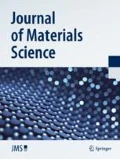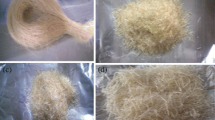Abstract
The effect of fibre concentration, temperature and mould thickness on tensile strength of single- and double-gated injection-moulded polypropylene copolymer reinforced with 0, 10, 20, 30 and 40 wt% short glass fibre was studied at a fixed strain-rate of 7.58 × 10−3 s−1 between 23 and 100 °C. It was found that tensile strength of single-gated mouldings, σc, increased with increasing volume fraction of fibres, ϕf in a nonlinear manner and decreased with increasing temperature in a linear manner. However, for ϕf values in the range 0–10% a simple additive rule-of-mixtures adequately described the variation of σc with ϕf over the entire temperature range 23–100 °C studied here. Tensile strength of double-gated mouldings like their single-gated counterparts decreased linearly with increasing temperature. The presence of weldlines significantly reduced tensile strength of double-gated composite mouldings but had little effect on tensile strength of the matrix. Weldline integrity factor, F σ, defined as weldline strength divided by unweld strength, decreased with increasing ϕf but increased with increasing temperature. A linear dependence was found between F σ and temperature. Mould thickness had no significant effect upon weld and unweld tensile strengths and consequently had no significant effect upon weldline integrity factor.














Similar content being viewed by others
References
Nabi ZU, Hashemi S (1998) J Mater Sci 33:2985. doi:10.1023/A:1004362915713
Hashemi S (2002) J Plast Rubber Compos 31:1
Hashemi S (2007) eXPRESS Polym Lett 1:688
Wilberforce S, Hashemi S (2009) J Mater Sci 44(5):1333. doi:10.1007/s10853-008-3233-6
Hashemi S, Lepessova Y (2007) J Mater Sci 42:2652. doi:10.1007/s10853-006-1358-z
Khamsehnezhad A, Hashemi S (2008) J Mater Sci 43:6344. doi:10.1007/s10853-008-2918-1
Necar M, Irfan-ul-Haq M, Khan Z (2003) J Mater Process Technol 142:247
Fu SY, Lauke B, Mader E, Yue CY, Hu X (2000) Composites A 31:1117
Fisa B (1985) Polym Compos 6:232
Thomason JL (2002) Compos Sci Technol 62:1455
Thomason JL (2001) Compos Sci Technol 61:2007
Mouhmid B, Imad A, Benseddiq N, Benmedakhene S, Maazouz A (2006) Polym Testing 25:544
Author information
Authors and Affiliations
Corresponding author
Rights and permissions
About this article
Cite this article
Hashemi, S., Onishi, P. Effect of fibre concentration, temperature and mould thickness on weldline integrity of short glass-fibre-reinforced polypropylene copolymer composites. J Mater Sci 44, 5588–5594 (2009). https://doi.org/10.1007/s10853-009-3786-z
Received:
Accepted:
Published:
Issue Date:
DOI: https://doi.org/10.1007/s10853-009-3786-z




